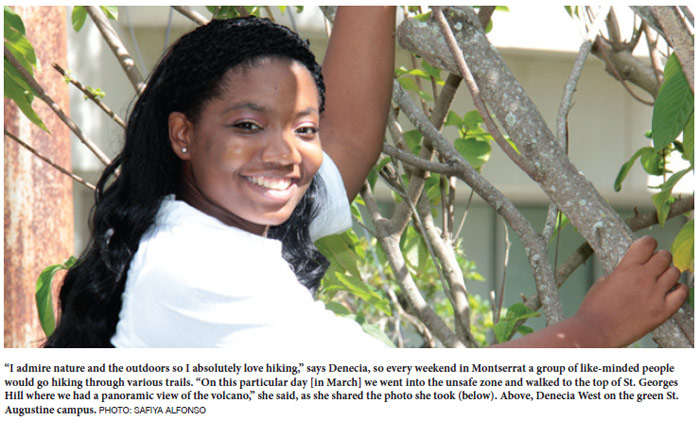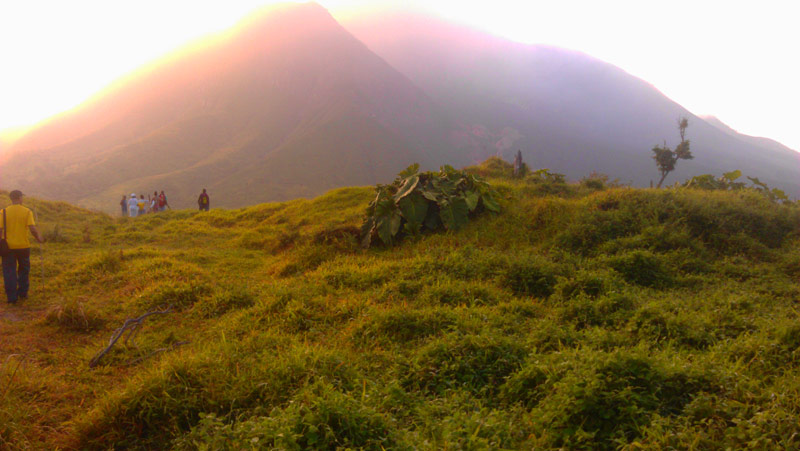 |
 |
 |
|
October 2013
|
Yawl see the same blue sky as we do? That was just one of the questions that came her way in her first days on what’s supposed to be one of the more sophisticated islands in the Caribbean. It didn’t surprise her too much though. Coming to UWI’s St Augustine campus on a partial scholarship called Rebuild Montserrat, Denecia West has had a load of odd questions. She’s been asked things that would make regionalists cringe over the lack of West Indian knowledge; but she’s also found that Caribbean friendliness has the same warmth no matter what twang it’s packaged in. “They don’t know anywhere in the Caribbean; if it’s not Trinidad, Barbados or Jamaica, they don’t know. A lot of people, I’ve told them I’m from Montserrat, and they say, oh, you speak French, don’t you? No, that is Martinique. They just don’t know,” she says with a wry smile. But she made friends quickly, and they have acted as guides, showing her the ropes, explaining jargon, introducing her to Trini cuisine, and making sure she understands the need to be vigilant about her security. Denecia has just begun her first semester in the Faculty of Social Sciences, reading for a BSc in Public Sector Management, an area she has always been interested in, mainly because of her disgust at poor service. “What grinds my gears is walking into an organisation and seeing people not doing their work, obviously wasting time; inefficiencies. Now, back home, there are some incidents of people in the public service not doing any work. I believe that I can make a change especially when you have mistakes—like million-dollar mistakes—just because one person did not do their job. I think there needs to be an iron fist (laughs) in the public sector. And for people to take their work seriously because a lot of people just go to work for 8 o’ clock, 8.30, and leave 4 o’clock, at 3:55. Nothing gets done.” “There is that, plus there is also what I believe is corruption, not only Montserrat, but in governments. Many people go into politics saying that they will fix corruption from the political side, but I believe that you can fix it from the administrative side. Say for instance a politician makes a decision; they say ‘we’re going to grant five people scholarships.’ That sounds very good, doesn’t it? But then, the administrators are responsible for choosing those people, and that is where, I think, the corruption is. Not all the time it is the politicians. Sometimes it is the administrators who need a slap on the wrist to understand that you can’t be biased, and nepotism and all of that doesn’t work all the time.” Denecia may sound like a fire-breathing dragon, but she’s really a cheery, spirited, gutsy 21-year-old with a strong sense of purpose, and one of them is to improve the quality of life for people generally. She grew up in post-volcano Montserrat, being just three when Soufrière erupted in 1995. The island, which once had a population of around 12,000, is really a massive re-building project, with almost everything either still under construction, newly-built, or about to begin. Nearly two-thirds of the island has been uninhabitable since then, and more than half the people have packed up and moved out of the British dependency. The population now stands at just under 6,000, a little less than students graduating from this campus every year, or just around half of the Queen’s Park Oval’s capacity. The eruption took away half of the country in more than one way, slashing a line right through its belly, disgorging countless families, many of whom had to be separated for long periods, ruining the economy (once a musician’s recording paradise), and virtually rendering the 16km x 11km island invisible to even its nearest neighbour to the north, Antigua. Living in an environment where services were always strained and limited, Denecia developed a fierce revulsion for inefficiency and corruption, and a desire for adventure, for stepping out of the confines of this space. So when she heard of the scholarship, she jumped at it, quickly applying to the St. Augustine campus and barely making the deadline. She’d heard Trinidad was a “big bacchanal city,” a giant ongoing party, and when she landed at Piarco International Airport, the first shock was the highways—the number of lanes, the volume of traffic—it was unlike the simple, uncluttered roads back home. Then, the taxi driver warned her about crime. Crime! The murder figures astound and scandalize her. In Montserrat, we may have a murder once every three or four years, she says. The biggest crimes are petty theft. “I lived by myself for two years. For the first two months I didn’t realise that my sliding door couldn’t close. I’d been sleeping in my bed, I’d been walking around my house, I left my house and came back, and the sliding doors never closed. Never locked. And nothing has happened to me. Nothing has ever happened to me. You know how many people fall asleep and leave their doors open? And here’s another thing. I know this one is going to catch you off. You’re leaving your car, and you want to leave the windows down, you leave the key inside; because if rain falls, somebody is going to come and close up the window for you.” Nobody would drive off with it? “And go where?” she asks. That’s when the enormity of this young woman’s leap from Montserrat to St Augustine really hits you and you want to cheer her on through the remarkable journey she has just begun.
|



